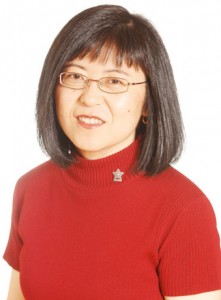Unions help win human rights for all
Name: Lorene Oikawa
Occupation: Vice President, BCGEU
Union: BCGEU
Unless all of us have human rights, none of us will have human rights.”
This quote, an homage to Rosemary Brown, a human rights activist and the first Black woman to be elected to a Canadian provincial legislature, is the source of great inspiration for Lorene Oikawa.
Lorene, a member of the B.C. Government and Service Employees’ Union for 25 years, has served as a Vice President of the BCGEU since 2005. Lorene is a lifelong activist and is dedicated to working towards social justice and workers’ rights. “We [at the BCGEU] support all workers to have safe and healthy workplaces, but we also want safe and healthy communities. We need to work together to effect the change we want to see, and to assist people to have their voices heard.”
Lorene is currently the Chair of BCGEU’s Equity and Human Rights Committee. The committee’s human rights work includes supporting the BCGEU Equity Network in which members self identify with one or more of four equity groups. The equity groups are Aboriginal workers, workers with disabilities (this includes any hidden disability), workers of colour, gay, lesbian, bi-sexual, and transgendered workers.
Working on this committee is a role Lorene is extremely passionate about and proud of. It is challenging to understand the barriers people face. “As a fourth generation Japanese Canadian, I have experienced discrimination,” says Lorene, adding that connecting with others through the Equity Network presents an opportunity to provide support on issues that may require political action.
“We need to work together to fight against racism and discrimination,” says Lorene. “It alarms me because I still see elements of it happening today. We need to speak up because all workers need safe, respectful working conditions.”
BCGEU members appreciate that the union provides a safe, welcoming place. “They know they have someone they can talk to, knowing that there are other members to ask for support, especially if they are scared to speak up and say anything,” says Lorene, adding that the union provides members with access to resources, which is especially important in cases where workers have been discriminated against.
“When someone’s human rights are taken away, it affects all of us,” says Lorene. “The work the union is doing with human rights issues is not just helping out our members, but people in the community that may be facing barriers.”
Lorene says that with regard to effecting change on bigger issues, there is strength in numbers. Whether it’s signing petitions, or being involved in various campaigns, it’s the power of voices, not just one. “It’s about having a voice and speaking out about something. Our union is only as strong as its members,” says Lorene.
“We want to work on legislation, policy change, and long-term solutions in order to achieve such goals as moving people out of poverty, building better child care solutions, and effectively reducing our carbon footprint. It’s not just the immediate outcomes that inspire me. It’s the possibility of change. There have been victories, but we can do so much more.”
Follow Lorene’s Twitter account to learn more: www.twitter.com/lorene1voice
